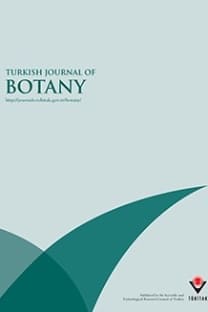Trianea bogotensis karst. (Hydrocharitaceae) köklerinin epidermis hücrelerinde zar potansiyelinin ve potasyum tasinmasinin düzenlenmesinde kalsiyumun önemi
The effect of calcium on changes in membrane potential (Em) and the activity of potassium ions (AK+) was studied in the root hairs of Trianea bogotensis Karst. (Hydrocharitaceae), grown in Hoagland-Arnon I (H-A) nutrient medium (NM) at various pH level. Under the decrease of pH and an increase in Al concentrations, there appears a depressive effect of bioelectric activity, increasing the depolarization of root hairs. At the same time, an increase in Ca concentration allowed Em to return to the stationary level. Under the increase of pH to 5.5, K+ - motive force (DµK+) reached a maximum value and proton-motive force (DµH+) decreased. Ca was necessary for maximum electrogenic activity of all rhizoderm cell types and for reducing the toxic influence of H+ and Al3+ ions under acidification. Induction of the Em electrogenic component by Ca ions is the result of a decrease in the Passive permeability of plasmalemma and activation of transport ATPases.
The importance of calcium in the regilation of membrane potential and potassium transport in the epidermal cells of trianea bogotensis karst. (Hydrocharitaceae)
The effect of calcium on changes in membrane potential (Em) and the activity of potassium ions (AK+) was studied in the root hairs of Trianea bogotensis Karst. (Hydrocharitaceae), grown in Hoagland-Arnon I (H-A) nutrient medium (NM) at various pH level. Under the decrease of pH and an increase in Al concentrations, there appears a depressive effect of bioelectric activity, increasing the depolarization of root hairs. At the same time, an increase in Ca concentration allowed Em to return to the stationary level. Under the increase of pH to 5.5, K+ - motive force (DµK+) reached a maximum value and proton-motive force (DµH+) decreased. Ca was necessary for maximum electrogenic activity of all rhizoderm cell types and for reducing the toxic influence of H+ and Al3+ ions under acidification. Induction of the Em electrogenic component by Ca ions is the result of a decrease in the Passive permeability of plasmalemma and activation of transport ATPases.
___
- ISSN: 1300-008X
- Yayın Aralığı: Yılda 6 Sayı
- Yayıncı: TÜBİTAK
Sayıdaki Diğer Makaleler
Nevin Ferdag SAHIN, Nazmiye SAKIYAN, Nur Münevver PINAR
Rena GANIEVA, Surhay ALLAKHVERDIEV, Sevil BAYRAMOVA, Saeedeh NAFISI
Paeonia tenuifolia L. üzerinde sitolojik ve sitoembriyolojik arastirmalar
Balya (Balikesir) ilçesinin makrofungusları
Jalal ALIEV, Shakhira ZAKHRABEKOVA, Tofik KARAGEZOV, Vidadi AJALOV
Valide M. ALI-ZADE, S. Tamara AKHUNDOVA, Firuza K. ALIEVA, Zemfira A. ZEINALOVA
Bazi clematis L. (Ranunculaceae) türlerinin karyotip analizleri
Gülcan SENEL, Sabri ÖZYURT, Mustafa ÖZKAN
Five new alchemmilla (Rosaceae) records for the flora of Turkey
